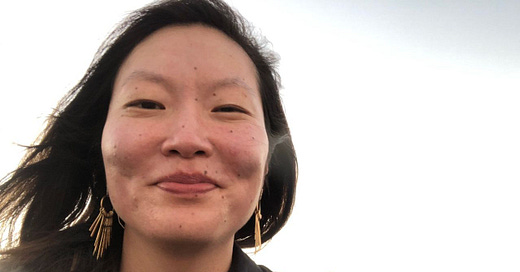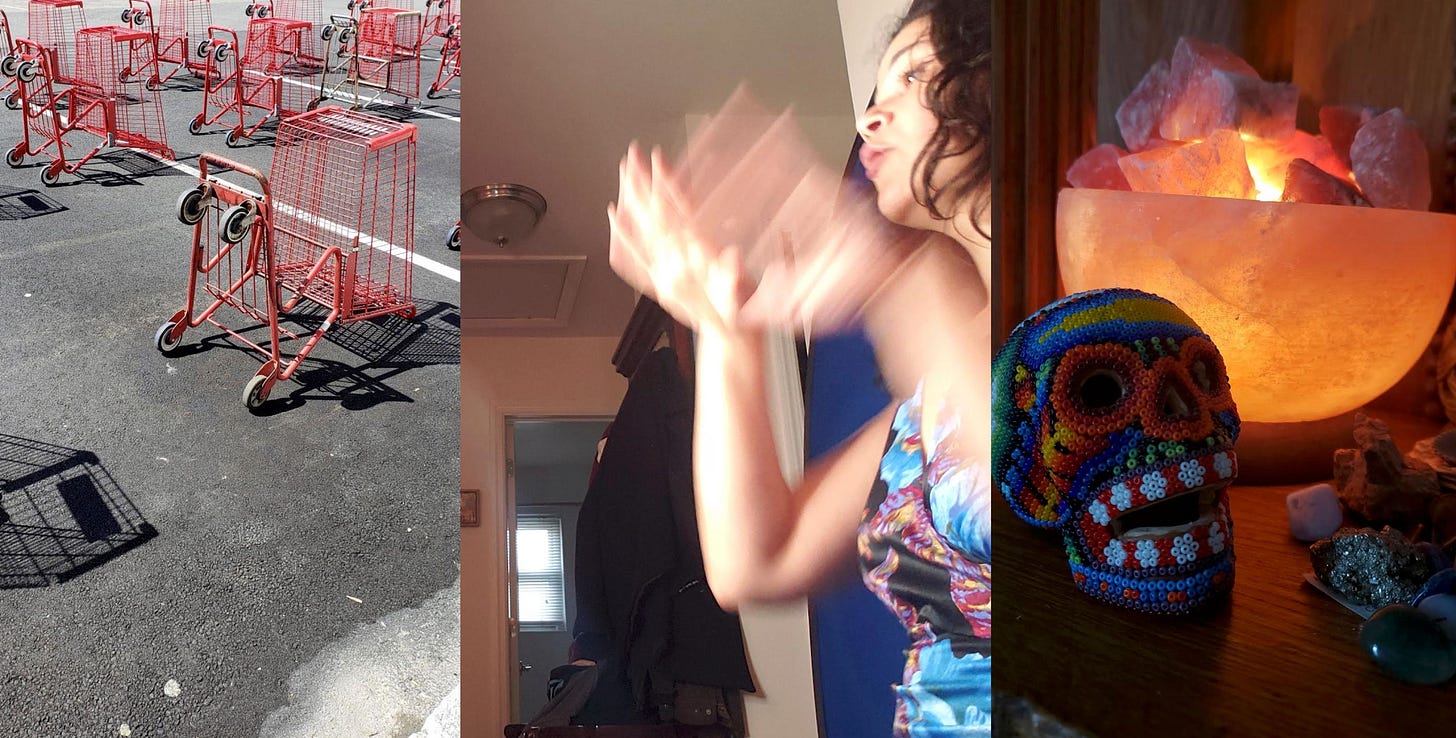Jenny Koons Is Building A Better Future. Air Guitar Is Involved
Koons discusses the Ars Nova Vision Residency, her advocacy work, and the practice of future building
From world-building games, to self-care gatherings, to interactive air guitar, Jenny Koons’ Vision Residency at Ars Nova is creating new forms of communal theatrical space in the virtual realm.
Koons has led the field as both director and organizer this past year, whether as co-artistic of Theatre For One’s Here We Are; a steering committee member of The Ghostlight Project; the founder of Let’s Talk About Hard Stuff, an AAPI anti-racist affinity space; or co-author of the open letter to the Biden/Harris administration advocating cabinet-level representation for Arts and Culture.
Her Vision Residency kicked off with an air guitar extravaganza, continues May 14th with RESILIENCE, a reflective work on self-care and Zoom fatigue crafted by BIPOC deaf artists, and concludes May 20th-21st with Stranger Futures: A World-Building Game, a participatory imagining of future utopias.
Koons spoke with me about the residency, her advocacy work, and the practice of future building.
As an artist who has been creating communal online work throughout the past year, what excited you about the Ars Nova Vision Residency in continuing to push that forward?
The big question for me was, what will get people to come into an online space even as we start to be able to be outdoors? And then the throughline of participation—what does it mean to participate in digital spaces, and are they actually as accessible as we think they are? That all felt very connected to the work I was doing before the pandemic, which always asked: Who is theater really for, how are you invited in, and is it really as alive as we say it is?
Friday’s show RESILIENCE is curated by Alexandria Wailes, who is an incredible Deaf artist. Zoom is for hearing people. Most of what theater has been doing online for a year has centered hearing people. With RESILIENCE you will see Deaf artists shape and shift this online platform.
All of the artists who are part of this residency want to push the technology further, and have been butting up against the rigid borders of what we can do in this virtual space. It’s a group of artists who are saying: I know this can be more than what we’re doing.
You’re on the steering committee of The Ghostlight Project, which was formed in the wake of Trump’s election. How is Ghostlight supporting the current work around creating safer and more equitable theater workplaces to return to?
It was inspiring at our March event to amplify movements, collectives, grass-roots coalitions that had already begun—of which there are so many, all doing incredible work. [The groups spotlighted included AAPAC, Broadway Black, New Native Theatre, and many more.]
Our first event, four years ago, was more symbolic and saw smaller communities coming together. Now there is a lot already happening. So it’s more about how we build networks and let people know what other people are doing, in an attempt to partner, co-exist, and support each other.
Different people are asking for different things. I don’t think we need to be all unified around one mission. Those different asks feel really important right now, because of all of the problems that we are facing.
For the AAPI community it remains a painful time, with hate incidents still spreading. Merely the fact that theaters now put out statements and resources in response to these events is more than what was happening before, but do you feel like the theater community is equipped to talk about and confront AAPI discrimination?
Theaters have publicly made a lot of statements over the past year and a half, both specific to the AAPI community and much more broadly. The question now becomes, as we start to move back into actively making work on stages, how does anti-racism become part of every minute-to-minute, day-to-day decision about how we make things.
You can do the consulting, you can read the books, you can take the workshops. But what we all do is, we make things. So, the real rubber to the road will be how you transfer that knowledge, [given that] every part of the process of how we’ve always made things is inequitable, from top to bottom.
RESILIENCE is, in part, about Zoom fatigue and self-care during this period. What has self-care meant for you personally?
One thing which has been useful for me, and is woven into this residency, is this practice of future building. Our world building game next week, Stranger Futures, is really about that: What would it mean if we were in the practice more frequently of imagining a future?
One book I read on speculative design said, in its introduction, “It’s a tragedy that it’s easier for us to imagine the end of the world than it is for us to imagine the end of capitalism.” We’re so practiced at imagining apocalypse, but not practiced at imagining other systems or ways of being with each other.
So that, for me, has been a vital component of self-care, to be thinking of something and a self that is far beyond my bodily presence here. What is this moving toward? What is the equitable future that we want? And can we get good at really describing what that is?
You and Rachel Chavkin’s letter to the Biden/Harris administration demanding cabinet-level representation for Arts and Culture garnered huge support—how has that advocacy work tied into the future building you’re describing?
The majority of my advocacy work since December has been around the American Recovery Plan and arts funding. One piece that has been lacking, as we’ve seen this past year, is the lack of a cabinet level Arts and Culture human, or humans, to advocate for us on the highest level.
We just had a call with the new Chief of Staff at the National Endowment for the Arts last week to talk about funding, and about this mass of money that is going to come through the NEA in the next six months. Because there’s no cabinet level representation, it’s relying on other departments to distribute that money because the NEA is a very small entity at the federal level. We’ve run up against that with the [delays around the] Shuttered Venue Operators Grant, and we’ll see it again with this secondary granting that’s going to happen this summer.
But the exciting part is that a lot of people are talking about this. When we wrote that letter in December, so many [officials] we talked to were like, “Good luck, never gonna happen!” And in three months with Biden and Harris in office, it is a different language and a different tone of change. And that is significant and felt.






